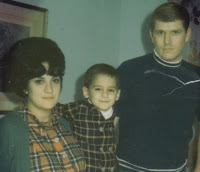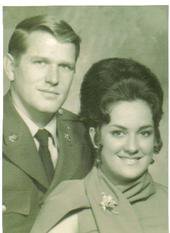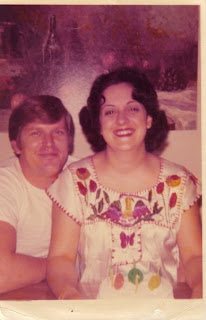Name: Ronald Pruitt (I call him Poppy and, to me, he will always be known as such)
Three words to describe yourself: "very, very, lazy"
Ron was born in Jemison, Alabama in 1944. He said the only way that people knew how to spell the town's name is because "they would yell it at the football games (J-E-M-I-S-O-N)". He loved living in Alabama but he "was oblivious of the fact that people living next door to me were unhappy" and "was programmed to block it out". People were suffering and "being held down socially". My grandpa was born in 1944, so he was growing up in Alabama during the time of the Civil Rights Movement.
He recalls a memory of kids riding bicycles on the streets selling popsicles and he thought to himself "Why can't I do that and make money?". So he applied, got the job, but was scorned by everyone in the neighborhood, but he quit because "the money wasn't all that great". My grandpa got his GED because he was "tired of school". After, he enrolled in hairdressing school and was the youngest male cosmetologist where he lived. But there was a stigma associated with cosmetology and he was constantly "defending [his] sexual leanings," however Poppy points out there was "a lot of potential for meeting girls". He decided "to do the most masculine thing" he possibly could and joined the army.
 |
| Raisa, my dad, and Ron in 1969 |
 |
| Just married in 1969 |
TEN DAYS after they met, Raisa and Ron were married, and he soon went back into the military and was stationed in El Paso, TX. From there the family moved to Alaska for three years. He said it was both a cultural shock, and a physical shock because of the climate change.
When he was younger, my grandpa wanted to be a disc jockey. He got one of his friends to train him how to use his voice to create PSA's and decrease his Southern drawl. When he applied to work in broadcasting/radio on base, he was denied because nobody could replace his current job, so my grandpa left the military. They moved back to Florida and my Aunt Becky was born shortly thereafter. He found a job, but was laid off, so they moved to Georgia where he got another job. He was laid-off again on a Tuesday and was back in the military by that Friday.
When he was younger, my grandpa wanted to be a disc jockey. He got one of his friends to train him how to use his voice to create PSA's and decrease his Southern drawl. When he applied to work in broadcasting/radio on base, he was denied because nobody could replace his current job, so my grandpa left the military. They moved back to Florida and my Aunt Becky was born shortly thereafter. He found a job, but was laid off, so they moved to Georgia where he got another job. He was laid-off again on a Tuesday and was back in the military by that Friday.
 |
| Alaska (1971) |
 |
| Ron and Raisa Pruitt (1975) |
Everyone involved in the conflict had to go to the base commander and the guy that my grandpa beat up was going to press charges on him. The base commander said that the warrant officer could continue to press charges on "Sargeant Pruitt" but that he didn't advise it because the man would not have made any further progress. The charges were dropped because both parties were at fault and had some responsibility. One of the conditions, however, was that my grandpa had to go to anger-management counseling. The counselor was an Italian doctor so "you can imagine how the interview went". The psychologist said that my grandpa could be transferred to Germany, but there was also a slight chance he could go to Greece. They were able to fill out all of the necessary paperwork and the family moved to Greece. They "loved it in Greece and got along with the people".
After Greece, the family moved back to Ft. Bliss, Texas, but my grandpa had to do one more European tour before he could retire. He had the option of bringing his family, but he would have to be in Europe for three years, or he could go by himself and be overseas for one year. He chose the latter option and went to Germany.
After retiring from the military, he worked in Florida at a drug treatment facility and took care of apartments for newly released prisoners that are assimilating back in to society. Then my grandpa got a job working for a hospice as a property caretaker. He said that working for the hospice was a turning point in his life because "from the military, [he] was never deprogrammed from the military". Further: "military is designed to destroy things and take lives . . . how they achieve that higher good". He was "going from being a docile person to working with people who could sympathize with others". The company "made [him] a better person". He worked at the hospice for thirteen years but had to retire early because of an injury that made him incapable of lifting heavy objects.
I asked my grandpa if there was anything else in his life that he would like to talk about before we finished the conversation and he said, "For most of my adult life, I have considered myself an atheist or agnostic". He is not atheist anymore, and my grandpa told me the story about how he became a Christian. He was "given some direction" by his sister, Carol (whom I get my middle name from). She had cancer and was being treated at the same hospital that my father was going for medical school in Maryland, so she became very close to my parents.
Carol eventually went back to her home in Alexandria, Louisiana and my grandpa my Aunt Becky went to visit her. Carol had told my grandpa that she knew where she was going, and that was heaven, and that she was sorry that she wouldn't see my grandpa in heaven because of his belief system. My grandpa said that "we'll have an agreement...we both know you're not going to be alive shortly...if there's any influence you can have on me, I want you to do it...my promise to you is I'll pray everyday for some sort of understanding or enlightenment". He kept his promise and Carol died two months later.
Even though he was agnostic, my grandpa has always enjoyed Christian music and would watch gospel music concerts on TV called 'Homecomings'. He talked about one song titled "Make it Real", and he used to say that was his hymn because it was a song for agnostics. My grandma surprised my grandpa with two tickets for their anniversary for one of these shows and they went. He said that the concert was uplifting, however, when he got there he noticed there were signs saying 'Ministry of...' and that the only reason they called themselves ministries was so they could be tax deductible. He then told me about a dream he had that changed his perception:
He was in a wooded area that was overgrown, "like a jungle", and he didn't know where he was going. He heard Christian music playing in the background and he came upon a clearing and saw a "barn with four equal sides. He walked inside and started singing with the people that were singing the Christian music and "something told [him] it was time to go". There was an old man standing next to the entrance and my grandpa asked him "What is this all about? What is the meaning?". The old man replied, "You don't have to know now". Then my grandpa said, "Can I come back here?" The old man said, "You're welcome anytime you want". When he started to leave the old man, the people in the barn started to sing a song that his father would hum to him as a kid. My grandpa never knew the words to the song, but he learned them in his dream, and the song was called "Farther Along". The lyrics go:
Farther along we'll know all about it
Farther along we'll understand why
Cheer up my brother live in the sunshine
Farther along we'll understand why
Cheer up my brother live in the sunshine
We'll understand it all by and by
My grandpa then continued "Cheer up my brother? Who else could that be speaking, but Carol?" From then "[his] mind was open and [he] could go to church and listen to instruction". The church has "given [him] so much" and things happen to him all the time that remind him that a higher power does exist. |
| The Pruitt family in Germany |

No comments:
Post a Comment